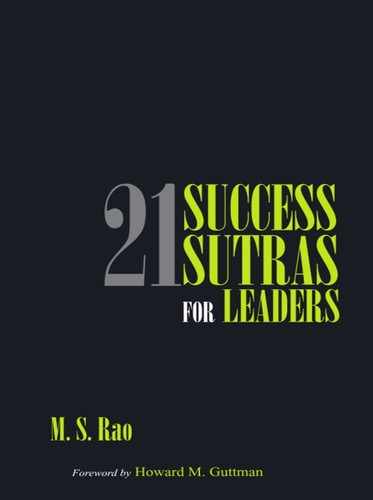Chapter Sixteen
Don’t Compete, Collaborate
Two are better than one, because they have a good return for their work: If one falls down, his friend can help him up. But pity the man who falls and has no one to help him up! Though one may be overpowered, two can defend themselves. A cord of three strands is not quickly broken.
King Solomon
With a dynamic global business environment, the permutations and combinations are changing rapidly. Companies are reinventing themselves with the changing business scenario. They are finding that collaboration is better than competition. Every company has its own strengths and weaknesses. The leaders currently capitalize on the strengths of competitors by collaborating, rather than competing, with them. The truth is that while competition is needed, excessive competition drains a lot of resources and energies. Hence, leaders must consider the current global climate and redesign their strategies in order to collaborate.
Collaboration
Helen Keller once remarked, ‘Alone we can do so little; together we can do so much.’ It indicates the significance of collaboration, as there is synergy. Collaboration is not something new to mankind. In the olden days, several leaders avoided competition with the strong ones and collaborated for mutual benefit, peace and prosperity. Collaboration involves a win-win situation for all, while competition involves win-lose or lose-win.
The advantage of collaboration is that people share their knowledge, skills, abilities and, above all, ideas to deliver better results. We find more creative solutions for problems as people think differently and present diversified ideas and insights. It adds value to work, thus leading to the best decision or solution. It capitalizes on the strengths of all the people for the collective good.
We find several global researchers and authors collaborating, rather than competing, to provide the best content to the readers. Although it does entail a division of labour and saves time, apart from leveraging diversified competencies, such collaboration pays off for authors and mostly for readers, as the latter receive a manuscript that has been welledited and proofread. At the workplace, too, we find employees coming together and working to achieve the best outcomes.
Collaboration and Leadership
In her 1994 Harvard Business Review article ‘Collaborative Advantage’, Rosabeth Moss Kanter talks about leaders who recognize that there are critical business relationships ‘that cannot be controlled by formal systems but require (a) dense web of interpersonal connections …’.1 When we observe leaders like Andrew Carnegie and Henry Ford, we see that they believed in more collaboration. Presently, the steel giant Lakshmi Niwas Mittal also believes strongly in collaboration. Leaders like Rick Wagoner (who turned General Motors around) were collaborative leaders who believed in hiring the best talent for restructuring the company.
Qualities of Collaborative Leaders
Collaborative leaders have open minds and are free of prejudices. They have the flexibility to accommodate and adjust with realities. They look below the surface and are visionaries. They are good listeners, and above all, they look at the ground realities.
Competition vs. Collaboration
If you have an apple and I have an apple and we exchange these apples then you and I will still each have one apple. But if you have an idea and I have an idea and we exchange these ideas, then each of us will have two ideas.
George Bernard Shaw
Competition emphasizes on ‘who wins’, while collaboration involves ‘we all win.’ Competition often creates complications, while collaboration creates camaraderie. By nature, people prefer to compete rather than collaborate. There are challenges involved in competition, as well as resources such as time, money and energy. However, when we take a longterm view, we see that it is ideal to work together for the overall benefit of the people and society, rather than involving focused negative energies to outsmart others. Man, by instinct, is competitive, and has been since primitive times. However, with civilization there is a need for a change in the mindsets of people, to work in peace for the overall good of the society.
The downside of collaboration is that it keeps people in their comfort zones rather than in effective zones. But when viewed in totality, competition is seen to create illwill and envy. It does more harm than good. It results in a loss of peace and prosperity. Hence, it is better to go by collaboration than competition.
A Creative Center for Leadership (CCL) study reveals, ‘Collaboration is critical to success.’ It further says, ‘Relationship building ranked tenth out of sixteen leadership competencies.’2 It indicates the growing importance attached to collaboration. Collaboration is desirable where more damage is being done through competition, and in situations where we can ensure peace, security and productivity of the people. What matters at the end of the day is the value we are adding and the difference we are making in the lives of others. Whether in politics or business, we have to look at the overall prosperity. If the gains are greater and the results concrete, then it is advisable to collaborate rather than compete.
In the ancient days, the slogan might is right prevailed. However, in today’s world this has been replaced by just is right. Similarly, in ancient days competition and the rule of the jungle prevailed. However, in today’s world people appreciate collaboration, which is congenial for both growth and prosperity. Hence, it is obvious that what worked in the past no longer works in the present. Henry Ford rightly noted, ‘Coming together is a beginning, keeping together is progress; working together is success.’ The twenty-first century is a period of coalition and collaboration. A new mindset must replace competition with collaboration. To summarize, it is always ideal to collaborate than to compete in the larger interests of mankind.
